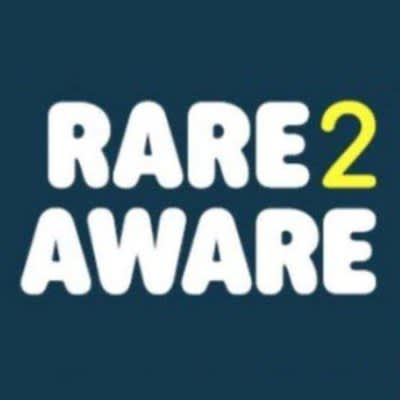Takeda’s focus on health equity: Rare Disease Day 2023 | Takeda Stories

Takeda’s focus on health equity: Rare Disease Day 2023
Standing with the rare disease community, our mission is to bring better health and a brighter future, no matter of circumstance or situation.
We are proud to be part of the global movement that is #RareDiseaseDay. This unique awareness day is curated annually by EURORDIS (Rare Diseases Europe) and its council of over 65 National Alliances as a focal point to engage and enable rare disease advocacy work around the world1. It’s a special time to unite the community to recognize and support the more than 300 million patients, their families, friends and caregivers who are impacted by one of more than 7,000 rare diseases2,3.
This year our ambition is to reduce burdens faced by people living with a rare disease, especially those at greatest risk of poor health due to their social or economic situation, access to healthcare or other societal factors.
As we aspire to achieve optimal health outcomes for everyone, we must work tirelessly and openly with the rare disease community. We must challenge unfair and avoidable differences in health across the globe and between different groups within society. We must identify and overcome these biases. Only then can we make health equity a reality.
Starting with a timely and accurate diagnosis
The rare disease community is negatively and disproportionately affected by a lack of disease awareness4. People living with a rare disease and their support networks can experience challenges in accessing the expert support and care they need5,7.
One of the greatest challenges for people living with a rare disease is the long diagnostic journey6,7,8. On average, it takes four to five years for a person with a rare disease to receive an accurate diagnosis6,11. For some people it can take more than a decade to be accurately diagnosed9, and for many an accurate diagnosis is never found6,11.
These challenges can be particularly felt by those living with a rare disease and facing health inequities, who may experience even further delays in diagnosis and care.10
Our commitment to act
We have never been more determined to seek out and break down barriers faced by the rare disease community. With our continued focus on those with the greatest unmet needs facing health inequity, we are committed to identifying and bridging gaps in care, so that one day everyone may hopefully achieve optimal health, starting with access to a timely and accurate diagnosis.
As we aspire towards our vision to help provide better health and a brighter future for all, we aim to embed health equity into everything we do.
In order to achieve optimal health outcomes for the rare disease community, we must pay special attention to people at greatest risk of poor health. We must identify and breakdown any barriers they face and bridge gaps, making health equity a reality. This is particularly important within rare diseases, as there is already a unique set of challenges faced by those who are affected by a rare disease and their loved ones.
One of the greatest challenges for people living with a rare disease is the long diagnostic journey.6,7,8 It can be incredibly difficult to reach a diagnosis, and for many, an accurate diagnosis is never found.6,9 In addition to this, a person living with a rare disease and facing health inequities can experience even further delays in diagnosis and care.10
Therefore, at Takeda, we stand with the rare disease community in our ambition to reduce burdens faced by people living with a rare disease, especially those who face health inequities, so that one day everyone may hopefully achieve optimal health, starting with access to a timely and accurate diagnosis.
Here are a few examples of projects we are proudly currently working on to improve the diagnostic experience and to drive health equity for people living with rare diseases.

Advancing health equity is key to creating a world where everyone has access to the resources and care they need to live their fullest, healthiest life1. As we strive towards a more inclusive health ecosystem, Takeda is dedicated to collaborating with the communities we serve to improve care at every stage of the patient journey and achieve community-level impact. We insist on maintaining a holistic view of people’s lives as we make good on our commitment to bring better health and a brighter future to patients worldwide. A key part of our company-wide effort is the Center for Health Equity and Patient Affairs (HEPA). First set up in 2020, HEPA consists of six multidisciplinary teams that work globally with internal and external partners to:
Improve access for patients and providers
Gather and integrate diverse perspectives from patients around the world into our work
Identify and address health inequities in communities with knowledge sharing that builds and strengthens infrastructure in communities
Build alliances and partnerships with external entities to help us all better understand and address the social determinants of health
As part of our company-wide efforts to advance health equity, HEPA is creating a living breathing knowledge network that advances health equity and enables our business to thrive. Through co-created solutions with internal and external partners, to date, HEPA has helped train 150 health-equity leaders in 30 countries and helped create more than 140 self-sufficient infrastructures operating independently. Since its creation, HEPA has also collaborated to complete 38 patient engagement programs improving patient outreach, recruitment, and retention in clinical trials across therapy areas.
HEPA brings everything it learns back to Takeda so that our business decisions and work reflect and provide the healthcare patients and communities with what they really need. There’s a lot more work to do but the strategic partnerships we’ve forged and our collaboration with communities, globally, have put Takeda on the right path towards doing our part to achieve health equity.
References
- World Health Organization. Health Equity. [Internet; cited February 2023]. Available from: https://www.who.int/health-topics/health-equity#tab=tab_1

Two years ago Takeda published a white paper, “Reducing Time to Diagnosis for People Living with Rare Diseases: A Conversation on US Policy Opportunities1.” The company remains committed to building upon this work.
That is why in February 2023, we proudly partnered with NORD, National Organization for Rare Disorders to host a round table discussion exploring the additional barriers patients from diverse backgrounds in the U.S. face in receiving a proper rare disease diagnosis. This conversation will help us provide policy recommendations and highlight opportunities to improve equity in diagnosis for these patients.
Obtaining a timely diagnosis can be incredibly difficult2,3. While the diagnostic journey can be long due to the difficulty of identifying and diagnosing rare diseases, it may be further complicated by health inequities, the unfair and avoidable differences in health status seen within and between groups of people and rooted in the social determinants of health4. Although each specific rare disease affects a small percentage of the population, together rare diseases are a significant public health challenge, impacting more than one in ten Americans. For patients from diverse and marginalized backgrounds living with rare disease, their struggle may be amplified within the healthcare setting5.
This roundtable discussion provides us with an opportunity to dig deeper into the issues faced by different communities and we’re excited to present our recommendations on how to address the challenges over the summer of 2023.
References
Takeda. Reducing Time to Diagnosis for People Living with Rare Diseases: A Conversation on U.S. Policy Opportunities. https://www.takeda.com/4aaf33/siteassets/system/what-we-do/areas-of-focus/rare-diseases/reduce-time-to-diagnosis-improve-access-to-care/reducing-time-to-diagnosis-2.pdf
Rare Diseases International. Diagnosis. [internet; cited February2023]. Available from: https://www.rarediseasesinternational.org/diagnosis/
Marwaha, S., Knowles, J.W. & Ashley, E.A. A guide for the diagnosis of rare and undiagnosed disease: beyond the exome. Genome Med 14, 23 (2022)
Rare Diseases International. Health Equity and Access. [internet; cited February 2023]. Available from: https://www.rarediseasesinternational.org/health-equity/
World Health Organization. Social determinants of health. [internet; cited February 2023]. Available from: https://www.who.int/health-topics/social-determinants-of-health#tab=tab_1

Takeda Thailand proudly hosted the first Southeast Asia Rare Disease Summit in January 2022 in collaboration with the Medical Genetics and Genomics Association, Genetic Society of Thailand, and Thai Rare Disease Foundation. The summit was broadcast live from Bangkok, Thailand, to over 500 participants across the world and was an inclusive forum for rare disease partners, alliances, and networks to join forces in strengthening the healthcare ecosystem.
With the theme ‘Bringing Rarity to Reality,’ the summit highlighted the need and commitment of the community to build a better future for rare disease patients and community across Southeast Asia and beyond. With engaging talks from industry representatives, researchers, academia, policy makers, payers, regulators, patient groups, and of course, patients themselves, the summit welcomed everyone.
With panel discussions on the topics of redefining diagnosis, empowering patient voices, improving care and innovative approaches for sustainable access, the event brought the greatest minds of the industry together to discuss how we can collectively ensure better health and a brighter future for all.

There is a place for everyone in our rare disease community. Rare2Aware, Takeda’s online social media platform, brings together patients – those seeking diagnosis, newly diagnosed or living with their disease for a long time – their family members, caregivers, healthcare professionals, and advocates. First formed in 2016, the Rare2Aware community is now over 80,000 individuals strong, across Twitter, Facebook and Instagram.
Rare2Aware is designed to champion and invite others to champion people living with a rare disease no matter of their circumstance or situation. It provides space to share, learn and contribute to raise awareness of rare conditions and the unmet patient need within this space. With a global audience and wide reach, our community can share their own experiences of living with a rare disease and support others around the world who face similar challenges. Living with a rare disease may be isolating, but together we are stronger.
At Takeda we are truly proud of Rare2Aware, and the part it plays in supporting the rare disease community. As we work towards our commitment to help address health inequities and delayed diagnosis, we hope the platform can be used by the community to share experiences, raise awareness, support each other and come together to make a difference that improves lives for people living with rare diseases.

Many rare disease patients have few or no symptoms at birth. It can take months before babies or children are diagnosed, and hence appropriate care and support given to families1. Newborn screening (NBS) includes routine medical tests shortly after birth, such as a simple blood test taken from the heels of babies and follow-on genetic tests if deemed necessary, that identifies risk factors to certain disorders as well as a number of rare diseases that can have serious health consequences.
Takeda is proud to support a number of initiatives that are looking to shorten the path to rare disease diagnosis in babies, leveraging NBS and digital technologies. Earlier diagnosis enables earlier intervention, with the hope of letting those affected live as long and normal a life as possible.
One such program that Takeda is proud to support is ScreenPlus – a voluntary newborn screening research study supported by the National Institutes of Health, and coordinated by the Albert Einstein Hospital and the Children’s Hospital at Montefiore, in New York (NY), USA. ScreenPlus offers parents of babies born at pilot hospitals the option to screen for 14 additional disorders not currently on NY’s routine newborn screening panel, expanding the number of children and conditions these centers can reach. ScreenPlus is also initiating long-term follow up for infants who are confirmed to have a condition identified.
As a sponsor of ScreenPlus, we are taking tangible action to increase medical understanding, research, and public awareness for the rare disease community. Helping to reduce the delays that families and babies with a rare disease have in accessing the right support and care they will need.
References
- EURORDIS. Newborn Screening. [internet; cited February 2023]. Available from: https://www.eurordis.org/our-priorities/diagnosis/newborn-screening/

Navigating the journey to a proper rare disease diagnosis and subsequent care can be incredibly difficult, and for many, a correct diagnosis is never found1,2. The journey can be further complicated for those at greatest risk of poor health due to their circumstances, situation or understanding of available local healthcare systems and processes3.
With an objective of identifying and breaking down barriers to diagnosis and care, Takeda Kazakhstan are proudly jointly sponsoring a live hot line for patients with inflammatory bowel diseases (IBD), a broad term that indicates inflammation of the gastrointestinal tract and a series of relatively rare conditions.
This sponsorship allows IBD patients to access practical, independent and personalized advice and information, alongside psychological and legal support. Free phone consultations are available from trained professionals, including access experts, psychologists and professional lawyers. Topics include access to diagnostics and care, hospital admissions, support in communication with government health authorities and much, much more.
Supporting communities in seeking out and overcoming barriers in diagnosis and care is at the heart of our commitment to drive health equity.
References
1. Rare Diseases International. Diagnosis. [internet; cited February2023]. Available from: https://www.rarediseasesinternational.org/diagnosis/
2. Marwaha, S., Knowles, J.W. & Ashley, E.A. A guide for the diagnosis of rare and undiagnosed disease: beyond the exome. Genome Med 14, 23 (2022)
3. Rare Diseases International. Health Equity and Access. [internet; cited February 2023]. Available from: https://www.rarediseasesinternational.org/health-equity/

We know achieving health equity is not something that any one company or organization can tackle alone. At Takeda we are committed to working with other organizations to help those living with cancer navigate through a complex and ever-changing landscape – from diagnosis to survivorship. A focus on health equity is critical to improve outcomes for underserved and underrepresented people with cancer – including the many rare types of cancer – and the ability for every person to achieve their full health potential.
We are driven to do our part to advance health equity by increasing community capacity, and empowering grassroots organizations who are leading the way and impacting change for their local community. Our Improving Health Equity in Cancer: A Community Grant Program aims to do just that.
The grant program was opened to applications in 2022 and will be awarding up to 1 million dollars in grant fundings to nonprofit community-based organizations that are providing services to people with cancer across their local community. Helping to support their vital role in raising awareness or improving access to diagnostics testing and evidence-based treatments, to support proper diagnosis and care among underserved patients, and advance health equity for all people living with cancer.
Standing with the rare disease community
The passion, drive and dedication of the rare disease community is a constant inspiration. A shining recent example of community collective success was the adoption of the UN Resolution on “Addressing the Challenges of Persons Living with a Rare Disease and their Families.”11
This first UN document to recognize people living with rare disease that called on the UN and member states to take action and address the challenges faced by the rare disease community is ground-breaking. We fully support this resolution as an important step towards global recognition and greater visibility for the community.
How you can get involved
Join us and call for action on the commitments made in the UN Resolution. Download Rare Disease International’s #ACT4RARE toolkit here: https://www.rarediseasesinternational.org/act4rare/. It’s time to act now.
Start a conversation on health equity and a timely diagnosis with a member of your rare disease community to help spread awareness. Why not join our Rare2Aware community? We are stronger together.
References
Rare Disease Day. What is rare disease day? [Internet; cited February 2023]. Available from: https://www.rarediseaseday.org/what-is-rare-disease-day/
Nguengang Wakap, S., Lambert, D.M., Olry, A. et al. Estimating cumulative point prevalence of rare diseases: analysis of the Orphanet database. Eur J Hum Genet 28, 165–173 (2020)
Orphanet. New scientific paper confirms 300 million people living with a rare disease worldwide. [Internet; cited February 2023]. Available from: https://download2.eurordis.org/pressreleases/PrevalencePaper_JointStatement_170919_Final.pdf
Rare Diseases. Barriers to rare disease diagnosis, care and treatment in the US: A 30-Year Comparative Analysis [Internet; cited February 2023]. Available from https://rarediseases.org/wp-content/uploads/2022/10/NRD-2088-Barriers-30-Yr-Survey-Report_FNL-2.pdf.
Chung CCY; Hong Kong Genome Project; Chu ATW, Chung BHY. Rare disease emerging as a global public health priority. Front Public Health. 2022 Oct 18;10:1028545. doi: 10.3389/fpubh.2022.1028545. PMID: 36339196; PMCID: PMC9632971.
Rare Diseases International. Diagnosis. [internet; cited February 2023]. Available from: https://www.rarediseasesinternational.org/diagnosis/
James K. Stoller. The challenge of Rare Diseases. Chest Journal, 153(6):1390-14 (2018)
World Economic Forum. It takes far too long for a rare disease to be diagnosed. Here’s how that can change. [internet; cited February 2023]. Available from: https://www.weforum.org/agenda/2020/02/it-takes-far-too-long-for-a-rare-disease-to-be-diagnosed-heres-how-that-can-change/#:~:text=The%20long%20road%20to%20diagnosis,as%20well%20as%20disease%20progression
Marwaha, S., Knowles, J.W. & Ashley, E.A. A guide for the diagnosis of rare and undiagnosed disease: beyond the exome. Genome Med 14, 23 (2022)
Rare Diseases International. Health Equity and Access. [internet; cited February 2023]. Available from: https://www.rarediseasesinternational.org/health-equity/
Rare Diseases International. UN Resolution on persons living with a rare disease [internet; cited February 2023]. Available from: https://www.rarediseasesinternational.org/un-resolution/
Share this story
